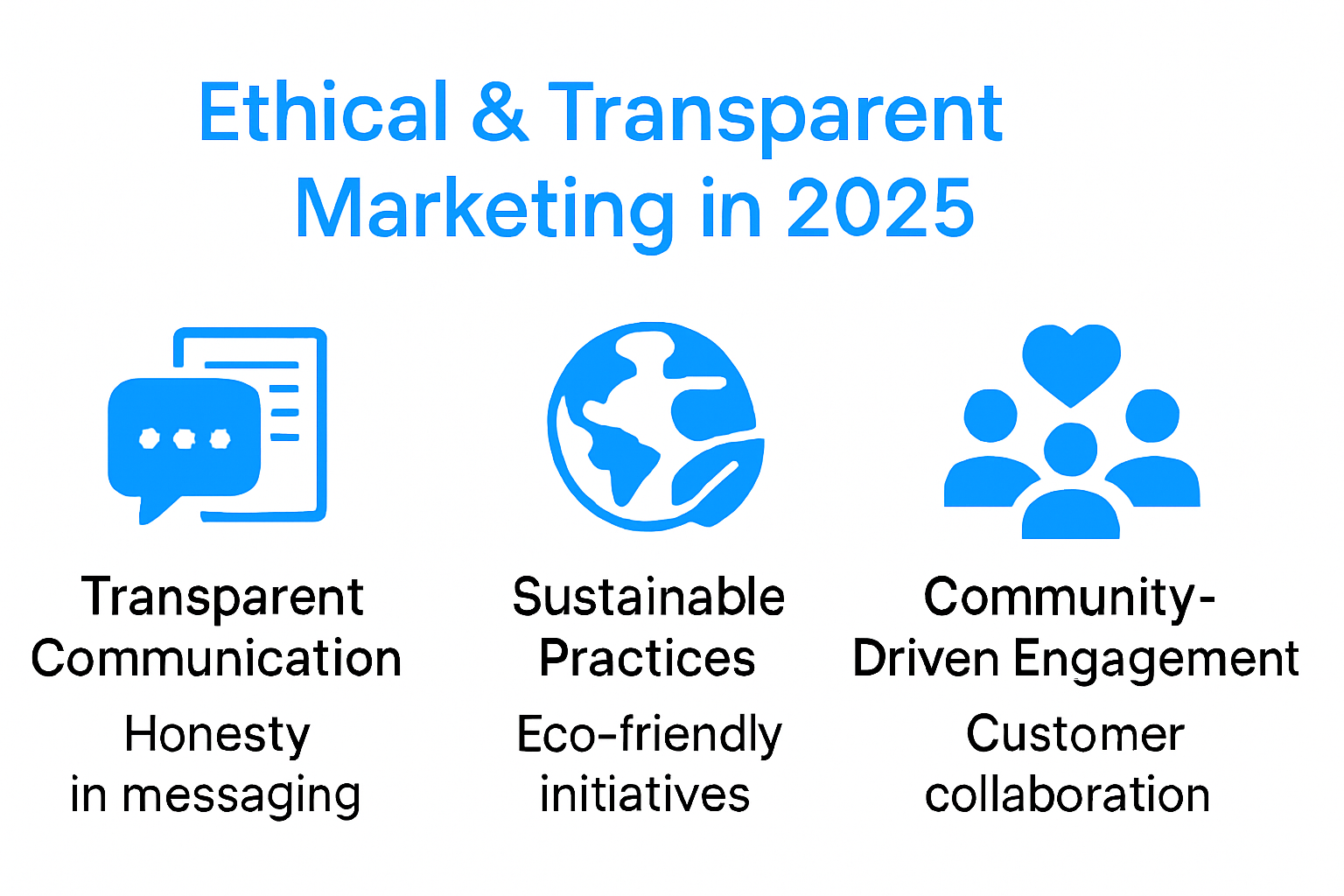Startups in 2025 are facing a tidal wave of new digital challenges. Tech has never moved faster and the need to stand out online has never been this urgent. Shockingly, businesses that leverage AI and data-driven marketing report up to 25 percent faster growth than their competitors. It might sound like only big budgets and fancy tools win the race but that is not the story here. Turns out the smartest growth tactics are often the simplest and most authentic ways to connect and build trust online.
Table of Contents
- Building A Strong Digital Presence For Startups
- Essential Digital Marketing Strategies For 2025
- Leveraging Tech And Cloud For Competitive Advantage
- Measuring Success And Scaling Growth Efficiently
Quick Summary
| Takeaway | Explanation |
|---|---|
| Establish a Strong Digital Brand | Build a cohesive brand across all platforms to enhance visibility and engagement. |
| Leverage Data for Personalisation | Use advanced analytics to create tailor-made experiences for each customer. |
| Adopt Emerging Marketing Channels | Utilize conversational and video-first marketing to capture audience interest effectively. |
| Implement AI and Automation | Integrate AI-powered tools for efficient customer interactions and operational processes. |
| Focus on Transparent Communication | Build trust by openly sharing values and engaging authentically with customers. |
Building a Strong Digital Presence for Startups
In the dynamic digital ecosystem of 2025, startups face unprecedented challenges and opportunities in establishing a compelling online identity. Creating a robust digital presence is no longer optional but a critical survival strategy for emerging businesses seeking to compete and thrive.
Strategic Digital Brand Positioning
Startups must approach digital presence as a comprehensive strategic initiative that goes beyond simple website creation. Learn more about modern business website essentials to understand the foundational requirements.
According to research published in the Strata International Journal of Social Issues, effective digital marketing strategies significantly improve startups’ chances of success by establishing a solid market foundation. This means developing a multifaceted approach that encompasses website design, content strategy, social media engagement, and targeted digital advertising.
Key elements of strategic digital brand positioning include:
- Consistent Visual Identity: Develop a cohesive brand aesthetic across all digital platforms
- Targeted Content Creation: Produce valuable, industry-specific content that addresses audience pain points
- Strategic Social Media Presence: Select platforms most relevant to your target demographic
Here’s a table summarising the core elements of strategic digital brand positioning for startups, as outlined in the content above.
| Element | Description | Example Action |
|---|---|---|
| Consistent Visual Identity | Cohesive brand look and feel across digital platforms | Use same logo and colours everywhere |
| Targeted Content Creation | Industry-specific, valuable content addressing audience pain points | Blog posts addressing client issues |
| Strategic Social Media | Presence on platforms relevant to target demographic | Focus on LinkedIn for B2B startups |
| Digital Advertising | Targeted ads that align with brand and audience | Run ads on platforms your customers use |
Advanced Digital Marketing Techniques
In 2025, digital marketing for startups requires a sophisticated, data-driven approach. Innovative off-page SEO strategies play a crucial role in enhancing online visibility and credibility.
The European Research on Management and Business Economics highlights the importance of integrating big data and web analytics as valuable tools for reaching potential customers and maintaining existing relationships.
Successful startups in 2025 will leverage:
- Personalised Digital Experiences: Utilising advanced analytics to create targeted user journeys
- AI-Powered Marketing Tools: Implementing intelligent automation for more efficient customer engagement
- Omnichannel Marketing Approaches: Creating seamless interactions across multiple digital platforms
Building Trust and Credibility
Digital presence is fundamentally about building trust. Startups must demonstrate expertise, transparency, and value through every digital touchpoint. This means crafting authentic narratives, showcasing genuine customer testimonials, and providing demonstrable proof of capability.
The digital landscape rewards businesses that can communicate their unique value proposition clearly and consistently. By focusing on creating meaningful connections rather than merely broadcasting messages, startups can transform their digital presence from a marketing channel into a powerful trust-building mechanism.
Key trust-building strategies include transparent communication, regular content updates, responsive customer interaction, and showcasing tangible results and case studies that validate the startup’s capabilities and vision.
Essential Digital Marketing Strategies for 2025
As digital landscapes continue to evolve rapidly, startups must develop agile and innovative marketing strategies that cut through the noise and deliver meaningful engagement. The marketing ecosystem of 2025 demands a nuanced approach that combines technological sophistication with genuine human connection.
Data-Driven Personalisation Techniques
Explore the most effective digital marketing channels to maximise your startup’s online impact. According to research from the Marketing Architect, personalisation will be the cornerstone of successful digital marketing strategies in 2025.
Key personalisation strategies include:
- Hyper-Targeted Content: Developing content that speaks directly to specific audience segments
- AI-Powered Customer Insights: Leveraging machine learning to understand individual customer preferences
- Dynamic User Experience: Creating adaptive web experiences that change based on user behaviour
Emerging Digital Marketing Channels
Traditional marketing channels are giving way to more interactive and immersive platforms. Research from Hogan Media Group highlights several emerging channels that startups should consider:
- Conversational Marketing: Implementing AI chatbots and interactive messaging platforms
- Video-First Content Strategy: Prioritising short-form and interactive video content
- Augmented Reality Marketing: Creating immersive brand experiences through AR technologies
Below is a table comparing the emerging digital marketing channels discussed above, including key features and examples.
| Channel | Key Features | Example Use Case |
|---|---|---|
| Conversational Marketing | AI chatbots, real-time messaging | Automated customer support on website |
| Video-First Content | Short, interactive videos, mobile-friendly | Product demos on Instagram Reels |
| Augmented Reality (AR) | Immersive, interactive experiences | Virtual try-on for ecommerce products |
Ethical and Transparent Marketing Approaches

In 2025, consumers are increasingly valuing brands that demonstrate authenticity, transparency, and social responsibility. Digital marketing strategies must go beyond mere promotion and focus on building genuine connections.
Successful startups will prioritise:
- Transparent Communication: Openly sharing brand values and business practices
- Sustainable Marketing Practices: Demonstrating commitment to social and environmental responsibility
- Community-Driven Engagement: Creating platforms for meaningful interaction with customers
By embracing these comprehensive digital marketing strategies, startups can create a powerful online presence that not only attracts customers but also builds long-term brand loyalty. The key lies in understanding that marketing is no longer about broadcasting messages, but about creating genuine, value-driven connections in an increasingly digital world.
Leveraging Tech and Cloud for Competitive Advantage
In the rapidly evolving digital ecosystem of 2025, technology and cloud infrastructure have become pivotal differentiators for startups seeking sustainable competitive advantages. Understand the fundamental role of web development in transforming business capabilities and driving innovation.
Strategic Cloud Infrastructure Integration
According to research published in SAGE Open, digital capabilities are critical in creating sustainable competitive advantages for emerging market businesses. Cloud technologies offer startups unprecedented scalability, flexibility, and cost-efficiency.
Key strategic cloud integration approaches include:
- Hybrid Cloud Solutions: Balancing public and private cloud infrastructures for optimal performance
- Microservices Architecture: Developing modular, easily scalable technological ecosystems
- Serverless Computing: Reducing infrastructure management overhead and improving operational efficiency
Technological Capabilities and Digital Transformation
The Journal of Innovation and Entrepreneurship highlights how technological determinants significantly impact startup success. Advanced tech adoption goes beyond mere implementation—it requires a holistic approach to digital transformation.
Competitive technological strategies encompass:
- AI-Powered Analytics: Leveraging machine learning for predictive business insights
- Cybersecurity Integration: Implementing robust security frameworks across digital platforms
- Automated Workflow Systems: Streamlining operational processes through intelligent automation
Technology as a Strategic Business Enabler
Research from ResearchGate emphasizes that digital transformation yields multiple benefits, including cost reduction, enhanced process efficiency, and improved integration capabilities.
Successful startups in 2025 will view technology not as a support function but as a core strategic asset. This means:
- Continuous Learning: Investing in technological skill development
- Agile Technology Adoption: Remaining flexible and responsive to emerging technological trends
- Innovation-Driven Culture: Encouraging experimental approaches to technological implementation
By comprehensively integrating advanced technologies and cloud infrastructure, startups can create robust, adaptable digital ecosystems that respond dynamically to market changes. The future belongs to organisations that can seamlessly blend technological innovation with strategic business vision, transforming digital capabilities into genuine competitive advantages.
Measuring Success and Scaling Growth Efficiently

In the dynamic startup ecosystem of 2025, measuring success and scaling growth requires a sophisticated, data-driven approach that goes beyond traditional metrics. Startups must develop comprehensive strategies that capture nuanced performance indicators and enable agile decision-making.
Advanced Performance Metrics and Analytics
Research analyzing technology-based new ventures reveals a compelling insight: web search traffic can serve as a robust indicator of startup growth dynamics. This underscores the importance of developing sophisticated digital performance tracking mechanisms.
Key performance metrics for modern startups include:
- Conversion Rate Optimization: Tracking granular user interaction and engagement levels
- Customer Acquisition Cost (CAC): Calculating precise investment required to attract each customer
- Lifetime Value (LTV) Analysis: Understanding long-term customer relationship potential
Growth Hacking and Experimental Scaling
According to research on startup scaling strategies, innovative business model approaches and growth hacking techniques are critical for rapid expansion. This involves continuous experimentation and data-driven decision-making to optimize customer acquisition strategies.
Effective growth hacking approaches encompass:
- Rapid Experimentation: Implementing quick, low-cost tests to validate growth hypotheses
- Viral Coefficient Tracking: Measuring the organic user acquisition potential
- Funnel Optimization: Identifying and eliminating friction points in customer conversion processes
Intelligent Experimentation and Learning Metrics
Advanced research on statistical experimentation suggests innovative approaches to reducing experimentation costs while maximizing learning potential. By developing intelligent metric frameworks, startups can accelerate decision-making and reduce resource wastage.
Strategic experimentation techniques include:
- A/B Testing Optimization: Implementing statistically robust testing methodologies
- Short-Term Signal Analysis: Capturing immediate performance indicators
- Predictive Performance Modeling: Developing advanced forecasting capabilities
Successful startups in 2025 will view measurement not as a retrospective exercise but as a dynamic, forward-looking strategic tool. By embracing sophisticated analytics, experimental approaches, and continuous learning, organizations can transform data into a powerful catalyst for sustainable growth and innovation.
The future of startup success lies in creating adaptive, intelligent systems that can rapidly interpret complex performance signals and make informed strategic decisions. Those who master this art of measurement and scaling will be best positioned to thrive in an increasingly competitive digital ecosystem.
Frequently Asked Questions
What are some effective digital marketing strategies for startups in 2025?
Effective digital marketing strategies for startups include leveraging data-driven personalisation, adopting emerging marketing channels like conversational marketing and video-first content, and focusing on ethical and transparent marketing approaches to build trust with customers.
How can data-driven techniques improve marketing outcomes for startups?
Data-driven techniques allow startups to tailor their marketing efforts to specific audience segments, provide personalised customer experiences, and make informed decisions based on analytics and customer insights, ultimately driving higher engagement and conversion rates.
Why is building a strong digital presence crucial for startups?
A strong digital presence helps startups stand out in a competitive landscape, enhances visibility, fosters customer engagement, and builds trust, which is essential for attracting and retaining customers in an increasingly digital world.
What role does technology play in the success of startups in 2025?
Technology is a strategic business enabler for startups, providing the necessary tools for automation, data analysis, and customer engagement. Incorporating technologies like AI, cloud computing, and advanced analytics can significantly enhance operational efficiency and market responsiveness.
Ready to Outpace Startup Challenges?
Navigating the digital world in 2025 is tough for startups. You are asked to build trust faster, reach the right customers, and show tech innovation at every step. This article highlights the urgency of claiming your online identity and making the most of advanced marketing tactics. But too many startups struggle with where to begin. Uncertain branding, weak web platforms, and scattered marketing often result in missed growth goals, as seen in the article’s focus on the need for strong digital brand positioning and seamless customer experiences.
Let CloudFusion help your startup move from digital confusion to digital growth. Our team combines deep web design, development, and cutting-edge digital marketing, so your business stands out with purpose and scale. See how we customise everything for startups by exploring our solutions for web design and development quotes. If you want a digital presence built for trust and speed, now is the time. Visit CloudFusion to request your tailored strategy today. Don’t let your competition get ahead in 2025. Make the move that sets your business apart.
Recommended
- Top Digital Marketing Channels for Success in 2025
- Why Businesses Need Websites in 2025: Key Benefits Explained
- Responsive Web Design in 2025: A Complete Guide for Businesses
- 5 Off-Page SEO Strategies to Skyrocket Your Search Results
- Digital Marketing Strategy Guide 2025 for Small Businesses
- Top Growth Hacking Secrets for Marketers in 2025








